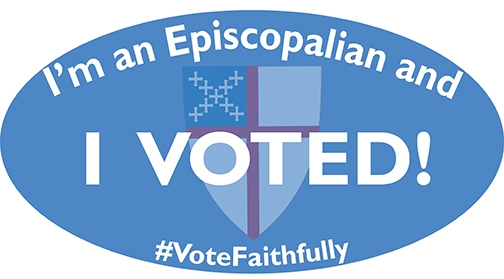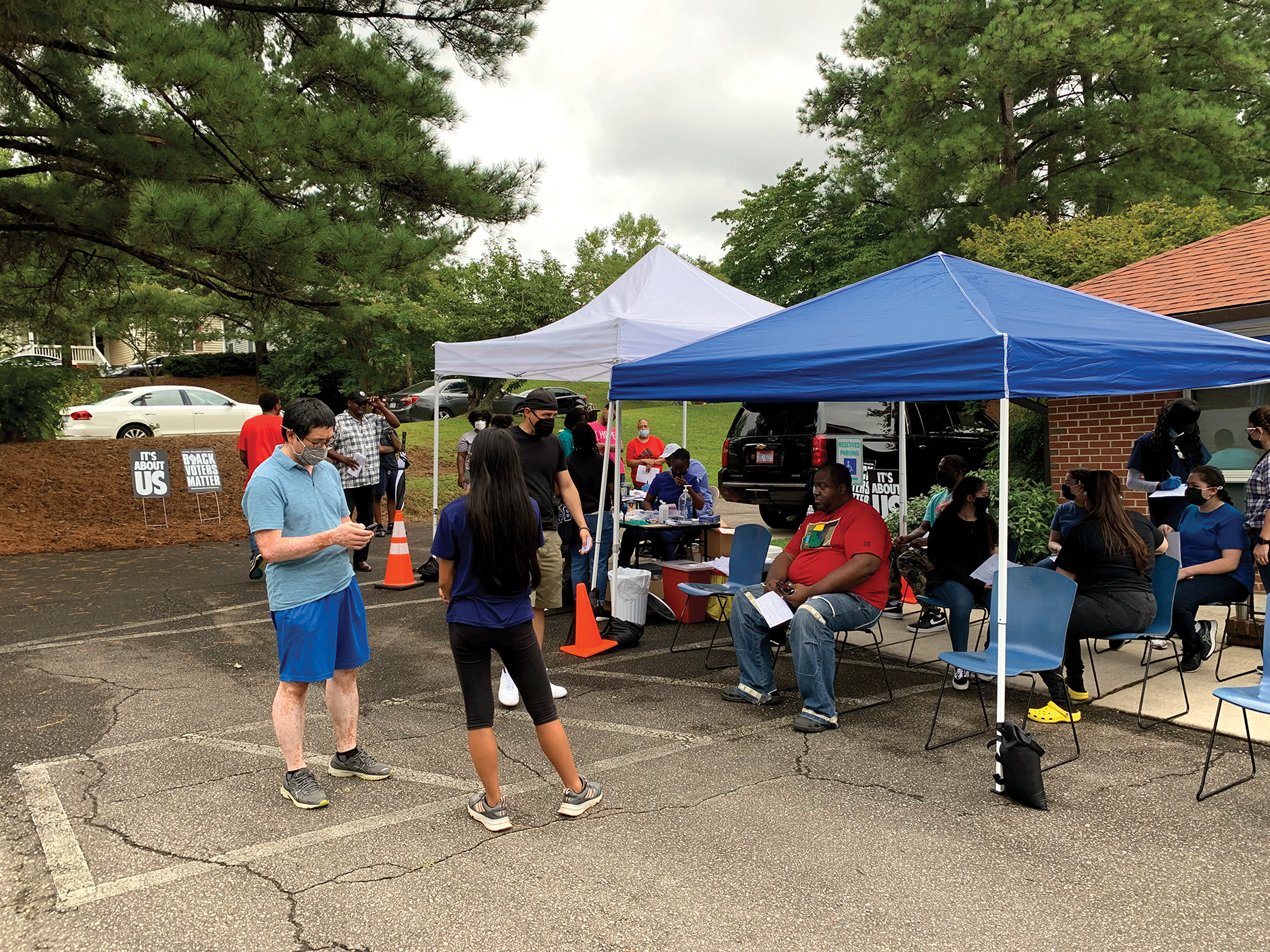Disciple: The Church’s Role in Getting out the Vote

Get souls to the polls. #VoteFaithfully. Vote your values.
By Alan Yarborough
“Cast your vote, not on a partisan basis, not based on your biases, but vote your values. Vote the values of human dignity and equality. Vote the values of the rock on which this country was built. Vote.”
-The Most Rev. Michael Curry
Calls for Episcopalians to engage in our democracy through voting are rooted in our faith. They instruct us to care for our neighbor by engaging in the public square, to uphold our tradition of interacting with our democracy through advocacy and elections, and to solidify the reasoning that to impact our communities, we must participate in the democratic process by casting our vote.
To be clear, our congregational call to engage is not about taking part in the campaigns of parties or candidates. While that may be done by individuals answering their own calls, that is not the role of churches. As churches, we may preach and share our values, but it is up to each individual to decide the parties and candidates that best represent those values. Answering the congregational call to voter engagement is about helping to ensure that every person eligible to cast a vote is able to do so.
Our work in the lead-up to any election is two-fold: first, as individuals, to make sure we are prepared to cast our vote, and second, to motivate and help others to cast their vote, too, making sure all who are eligible are prepared and educated.
START WITH YOU
Let’s begin with the first part, making sure you are a voter. Below is a simple check list; see the end of the article for resources to share with your friends and post in your parish.
- Register: Pay attention to registration deadlines. Don’t wait until it’s too late. If you have not already done so, make sure you are registered! Think you are already? Check your registration status. Moved recently? Don’t forget to update your registration!
- Study the ballot: Make sure to take time and learn who and what will be on the ballot. Elections involve more than federal elected officials; local and state offices have significant impact in your community. Find out who is running and learn about their values to know if they align with your own.
- Explore the issues: Figure out what issues are important to you. Consider attending town halls any candidates may be organizing to learn more about them and even ask your own questions. You can also explore Episcopal Church positions on dozens of topics using resources from the Office of Government Relations. We all have different issues that speak to us; knowing and asking your candidates about those issues can help you with your discernment on for whom to cast your vote.
- Make a plan to vote and VOTE: Pay attention to deadlines, and make a plan to vote. In North Carolina, Election Day is on November 8, 2022. Early voting begins October 20, with in-person, by mail and absentee options. Choose an option that works best for you and follow through with the process.
HELPING OTHERS
Now onto the second part: helping others vote. Historically, Episcopalians have high rates of voter participation, but our work does not stop with those in our pews. Our churches, existing in broader communities, can play a role to help others cast their votes as well.
Here are some broader points to keep in mind. The Episcopal Church does not take positions on any political candidates or parties, and clergy are not allowed to tell others how to vote when in their pulpit. Voter engagement within the church is, and must be, exclusively nonpartisan, meaning we cannot support or denounce a candidate or political party in the elections. The goal of our engagement is to increase our commitment to our communities by providing resources and support to ensure those eligible are registered, ready and able to vote. Doing so is an example of loving thy neighbor.
Here are some ideas for engaging both your church community and those around it:

[St. Ambrose, Raleigh, hosted a voter drive and vaccination event on August 7, 2021. Photo by Carl Harper]
Celebrate the voting process by joining the Civic Holidays celebrations for National Voter Registration Day, Vote Early Day, Voter Education Week and Election Heroes Day. They have amazing resources ready for you to use in your local area, including a menu of actions from Vote Early Day that faith groups in particular can engage in around the election.
Communicate important information about the election process through church channels including Sunday bulletins, e-newsletters, physical bulletin boards or even phone banking for your parish and community. Share reliable basic voter information, organize webinars or seminars about options for casting votes, offer transportation to voting sites (including early voting) or child care on Election Day. Even people who are not eligible to vote (because of age, citizenship status, criminal convictions, etc.) can assist the broader community in getting out the vote.
Educate yourself and others about the security of our election processes. Evidence shows our state systems are strong against security threats, resulting in a remarkably low incidence rate of fraud. Misinformation around these processes may be prevalent, and it is important to equip ourselves with ways to identify and combat misinformation as well as an understanding of our election processes themselves. Use the Church’s misinformation resource to help you navigate messaging around elections, including from candidate ads and publications.
Do not overlook the role your church can play beyond its walls in helping to get out the vote. Make sure to message about the election through existing ministries, like notices at food ministries or a sign in your community garden reminding people to vote. Located in a busy area? Organize volunteers to hand out nonpartisan voter information from the street corner, go door-to-door with election reminders, or join local phone banks to call and remind people to register and vote.
Engage in the process of voting in a more formal role, either as an election official or through organizations that support voter protection, like 866-OUR-VOTE. You can help make sure elections run smoothly by working directly for the process at polling stations through early voting and on Election Day or by assisting with voter protection services in person or through phone hotlines.
Connect with the Episcopal Church Office of Government Relations (OGR), which has a Vote Faithfully Election Engagement Toolkit, available in English and Spanish. In it, you’ll find recommendations and resources on how to go about this work. OGR also has volunteer opportunities for anyone who may want to connect with people across the United States in helping to implement voting efforts in their part of the church. Consider joining their Election Activator program to
help out.
We can also be prayerful around our elections. Organize a #VoteFaithfully Sunday on November 6, using worship resources from the Office of Government Relation’s Vote Faithfully toolkit. Consider hosting an in-person or virtual vigil or even a celebratory event the night before Election Day.
You don’t have to do this by yourself. Network locally with faith-based and secular groups already doing nonpartisan voter engagement. Is there a church that serves communities with lower voter participation rates? Are they open to partnership? Could you assist another house of worship that serves as a polling site help get out the vote? Can you bring a faith voice into secular spaces promoting participation in our election?
Finally, many of you may be interested in advocacy on voting rights. While not a direct part of our call to action here, advocacy on legislation and policy that improves and protects the right of all to cast their votes can be an important part of this work. To get more engaged in this, sign up for The Episcopal Public Policy Network Action Alerts or look for local state-level organizations engaging in voting rights advocacy.
I hope these ideas serve to show how many different ways you can get involved. There are opportunities for creativity, relationship, collaboration and simply having fun by helping all in our communities participate in this year’s election cycle. Have ideas for more engagement or a success story you wish to share? You can reach out to us at [email protected].
Happy voting!
Alan Yarborough is the church relations officer for the Episcopal Church Office of Government Relations.
VOTER PREPAREDNESS RESOURCES
Key North Carolina Deadlines
The statewide general election, or “midterms,” is on November 8, 2022. Per the NC State Board of Elections, key dates related to the upcoming election include:
- September 9—The date by which the boards of elections must make available absentee ballots.
- October 14—Civilian voter registration deadline. After this point, only same-day registration during one-stop early voting is available.
- October 20—One-stop, in-person early voting period begins.
- November 1—Deadline for civilians to submit an absentee ballot request form.
- November 5—One-stop, in-person early voting period ends at 3 p.m.
- November 8—Election Day and civilian absentee ballot return deadline.
Voter Registration Resources
NC State Board of Elections | ncsbe.gov/voting
Find information on North Carolina registration deadlines, ballot information, sample ballots, election information and more. This site also provides information on how to track your cast ballot to ensure it counted and volunteering as an election official.
Vote.org
Check your registration, register to vote, find your polling place, set election reminders – essentially, track and take care of all your voting needs.
Am I registered to vote? Check it here: vote.org/am-i-registered-to-vote/
Community Engagement Resources | CivicHolidays.org
Civic Holidays brings together organizers of nonpartisan days of action. Support materials are available for each holiday at no cost; visit CivicHolidays.org to download.
- September 20 – Voter Registration Day
- October 3-7 – National Voter Education Week
- October 28 – Vote Early Day (engagement opportunity a la Blessing of the Animals)
- November 8 – Election Day
Election Protection | 866ourvote.org
A “national, nonpartisan Election Protection coalition works year-round to ensure that all voters have an equal opportunity to vote and have that vote count.”
The Episcopal Church Office of Government Relations | bit.ly/EpiscopalChurchOGR
While it takes no position on parties or candidates, the Episcopal Church does have positions on issues, and there are many ways we engage in our constitutional right to petition the government. Regardless of where any of us lie in our decision of who to vote for, we can come together in celebration of the right to vote by following through with our duty to vote.
Visit bit.ly/EpiscopalOGR-Nov2022 for resources such as:
- Vote Faithfully Election Engagement Toolkit
- Election Activator
- Ways to recognize and overcome misinformation
- Order #VoteFaithfully stickers and magnets
Sign up for EPPN action alerts at bit.ly/EPPNActionAlerts.
Tags: North Carolina Disciple
